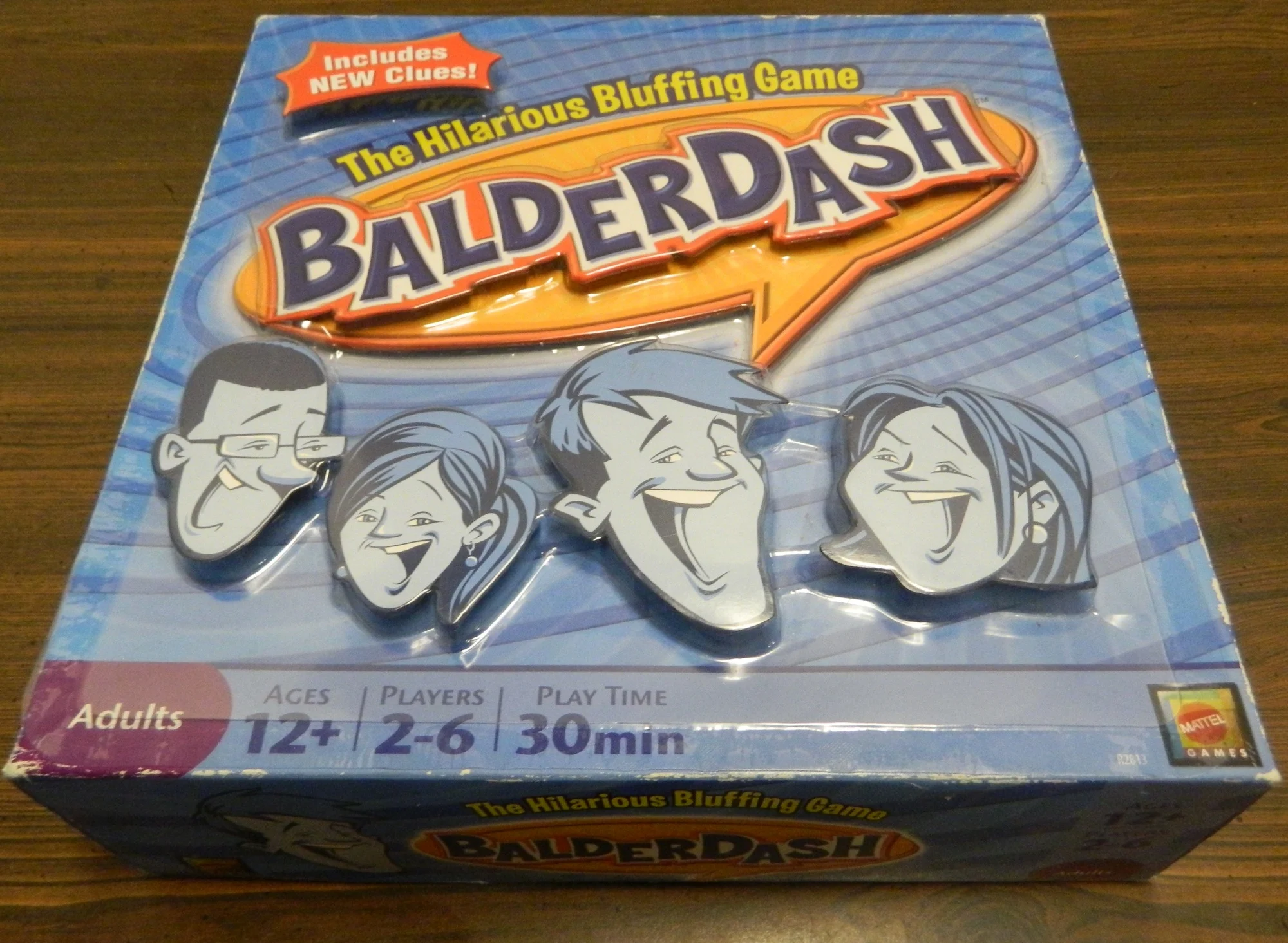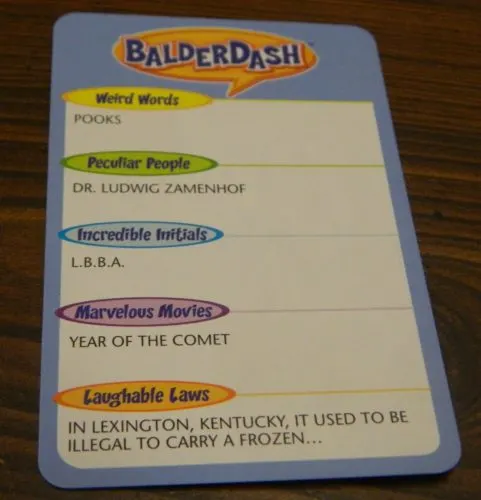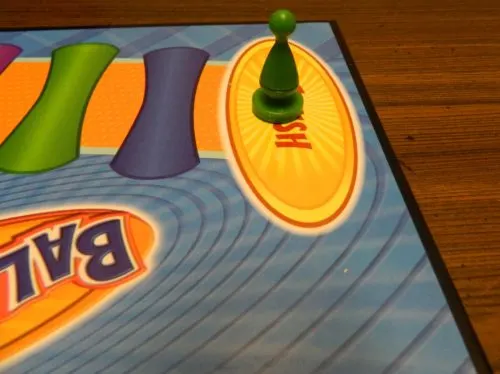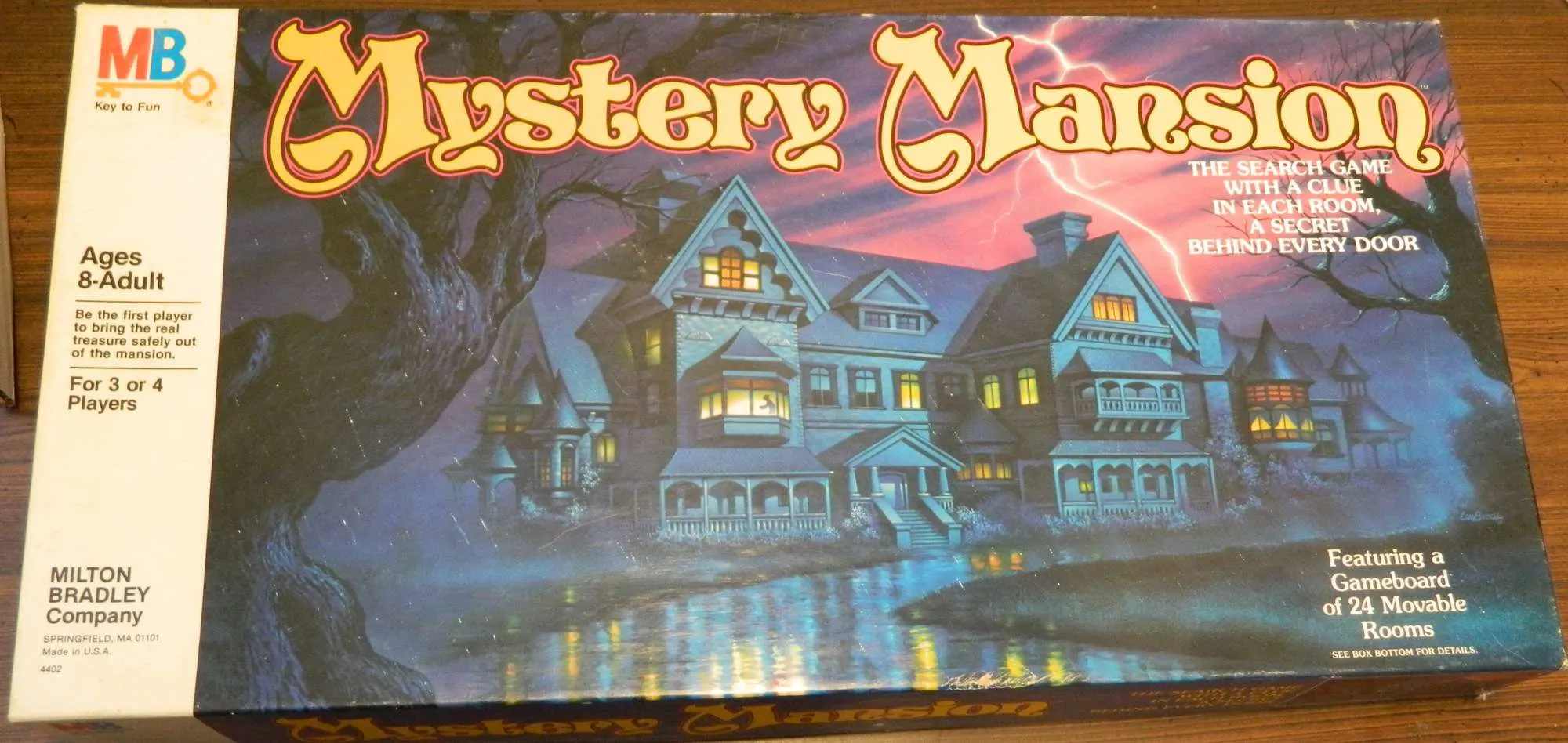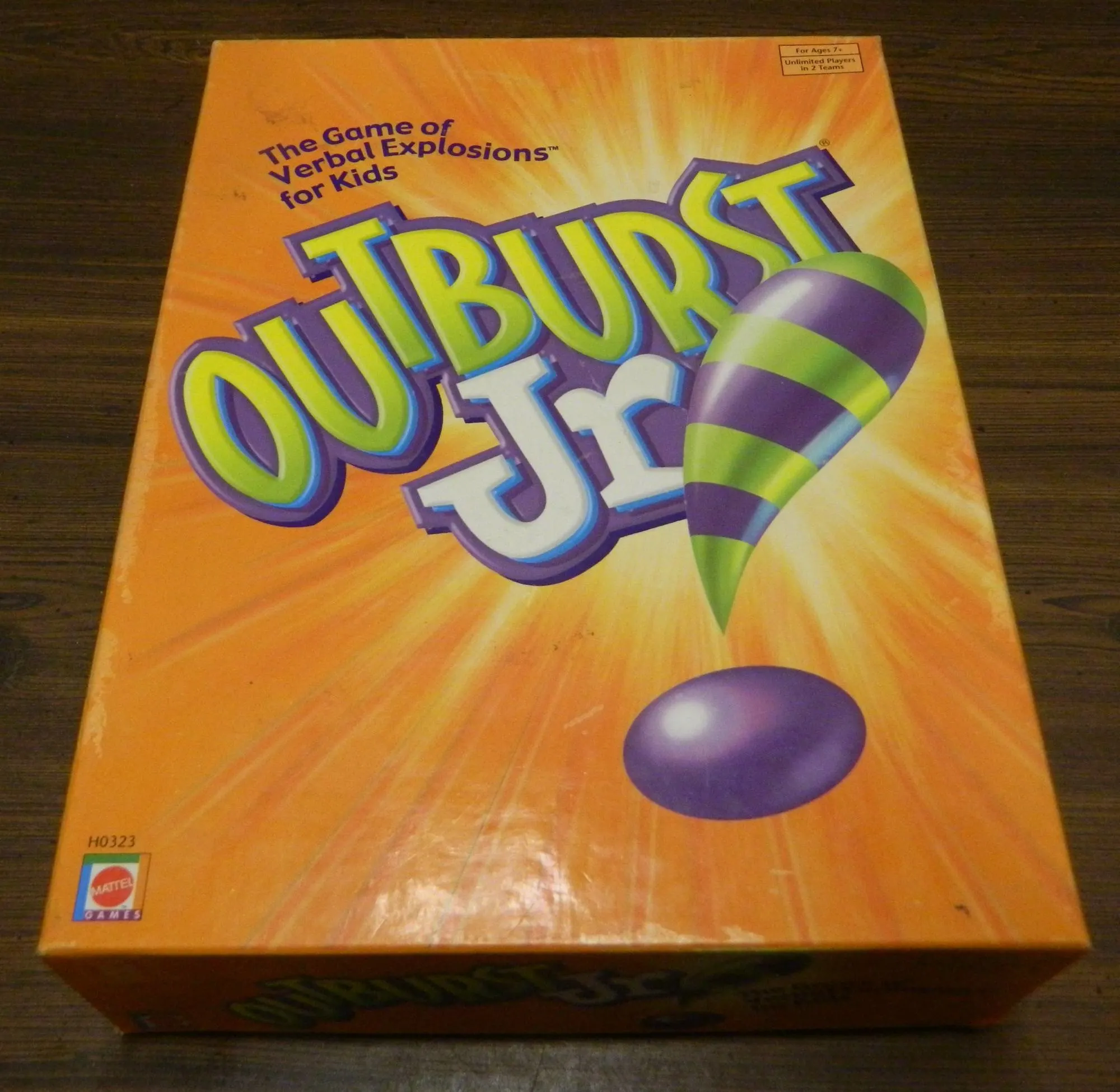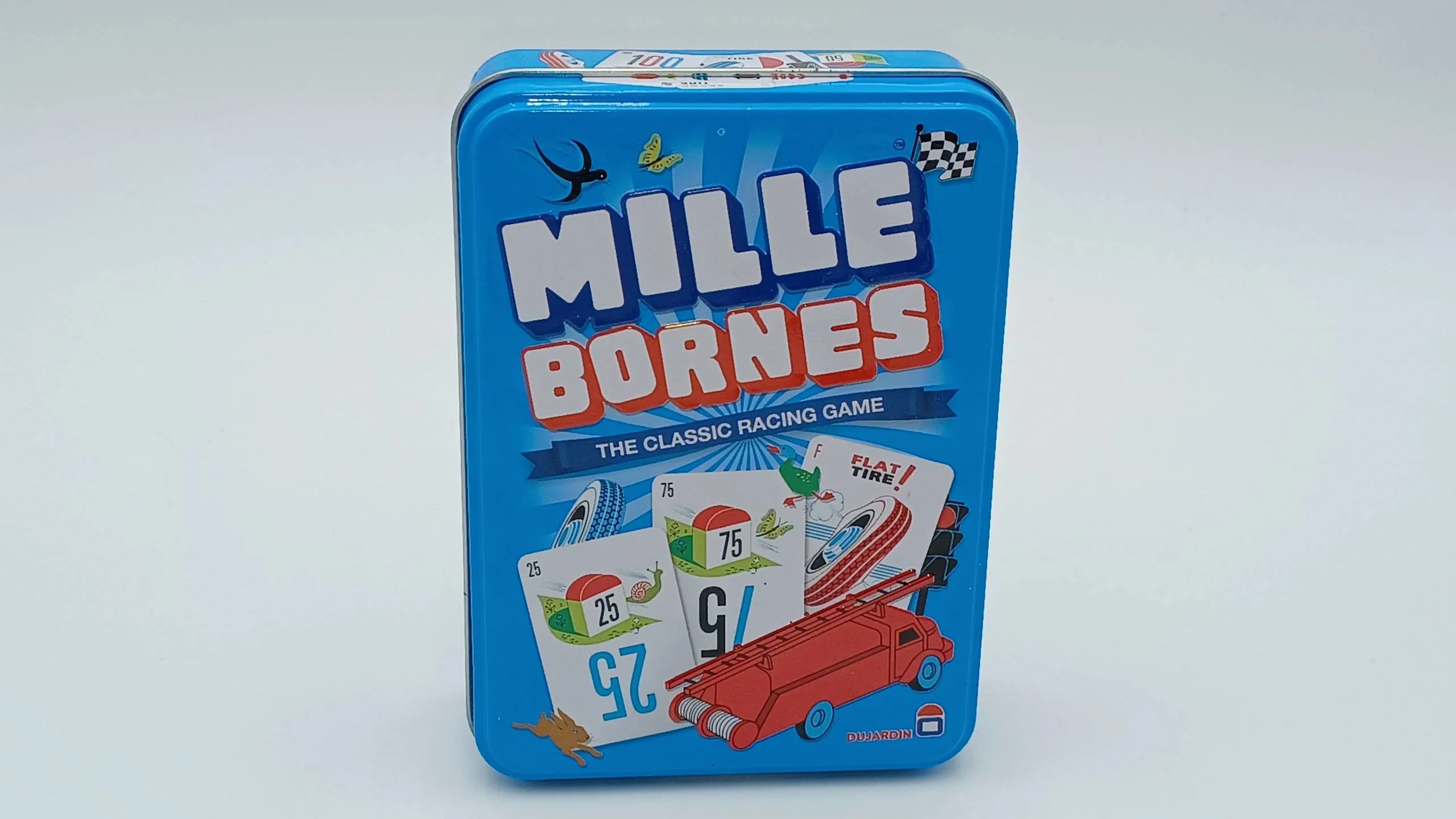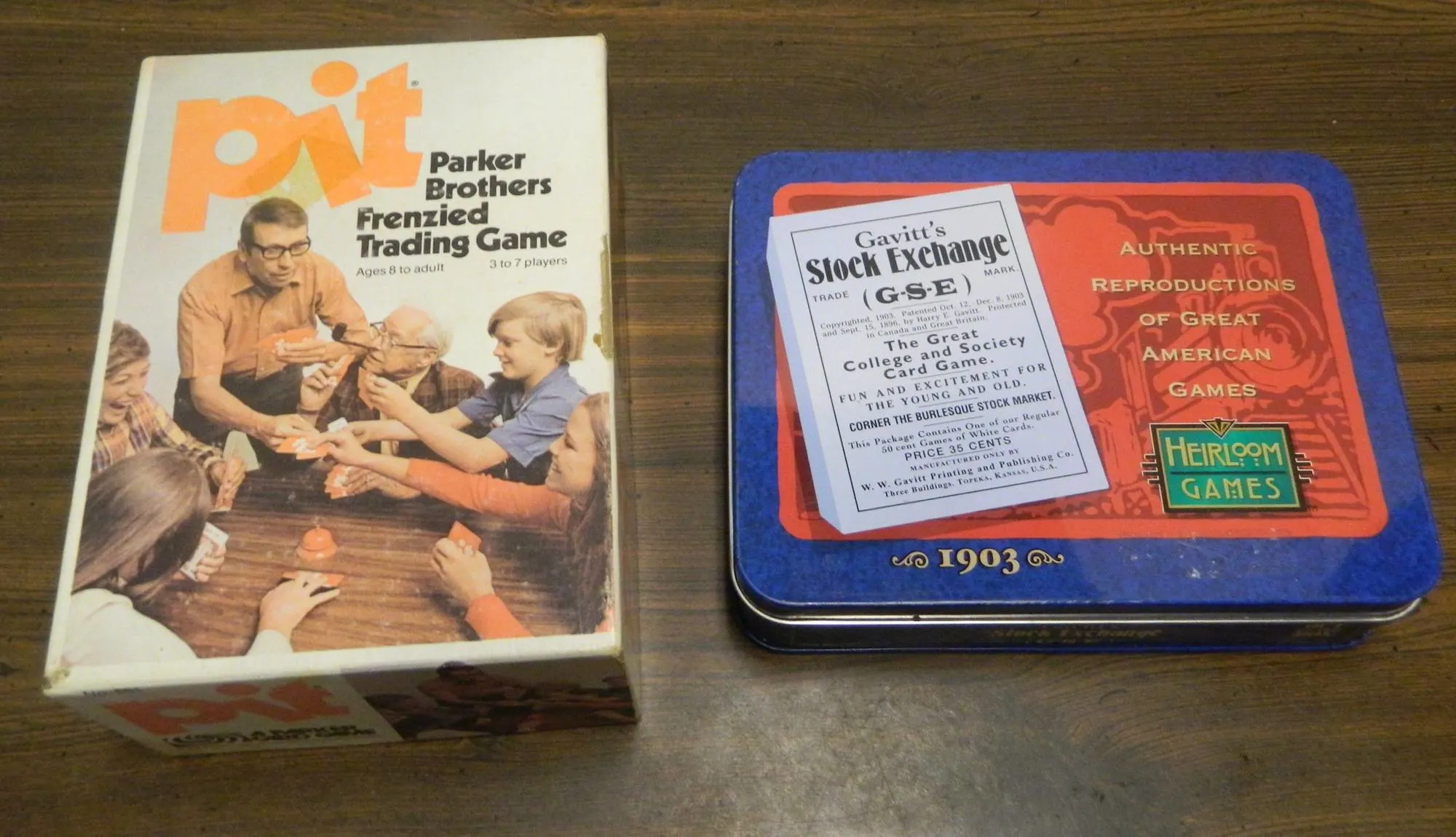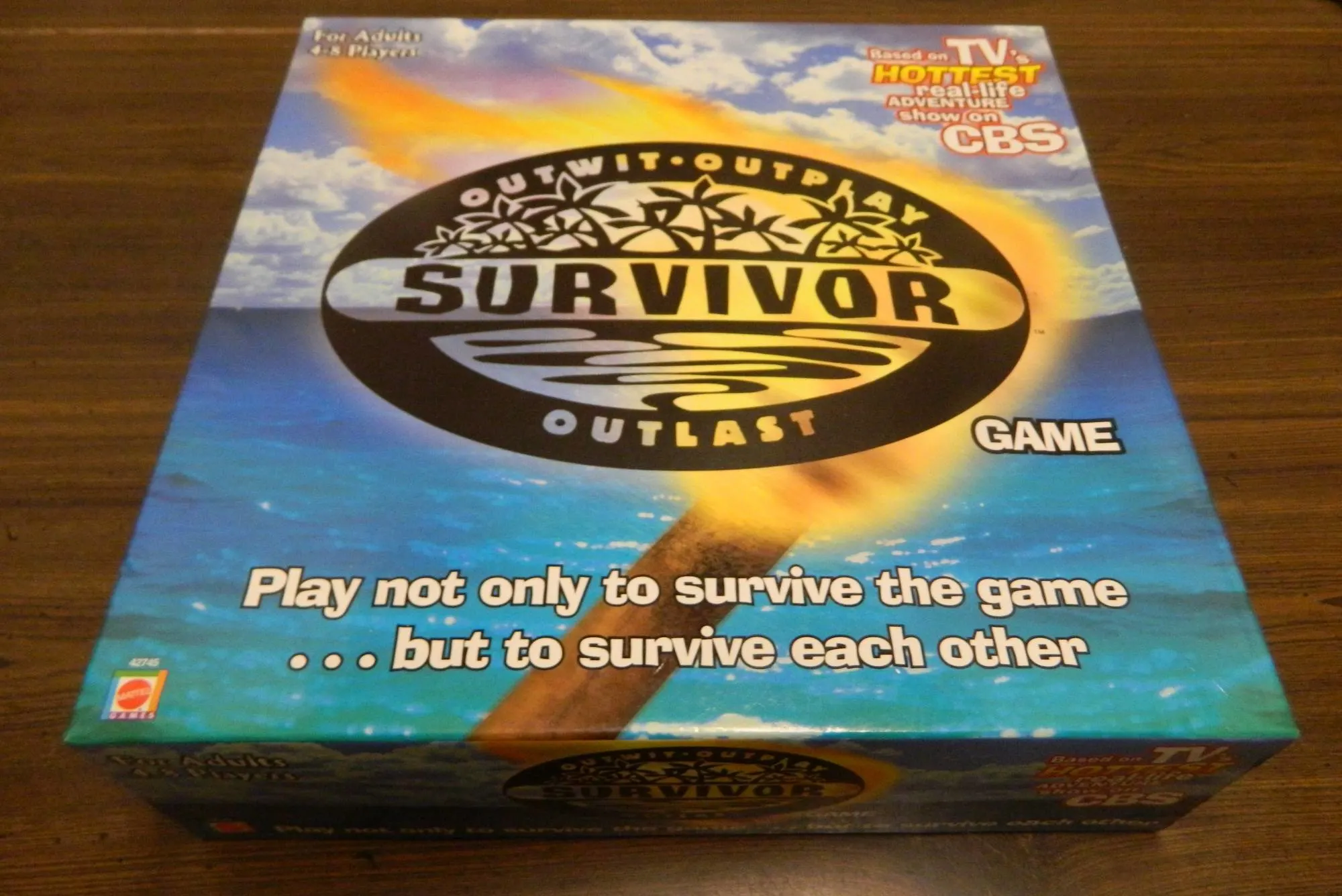Dictionary is a public domain game that has been around for quite a few years. Basically in Dictionary you grab a dictionary and randomly choose a word from it that none of the other players recognize. Players write their own definitions for the word and players then try to figure out the actual definition for the word. If that sounds familiar it should since that is the premise for the original Balderdash. Balderdash is basically a more polished version of Dictionary. Despite that fact and many games trying to improve on Balderdash over the years, Balderdash still remains a good game to this day.
How to Play Balderdash
Setup
Place the gameboard in the middle of the table. Each player takes a pen or pencil and several answer sheets. Each player chooses their playing piece and places it on the start space. All of the players roll the die with the player with the highest roll being the first “dasher” (reader).
Playing the Game
To begin a player’s turn they roll the die. The player takes a card and reads the category corresponding to the number rolled. If the player rolled a six they can choose which category they want to play. The categories are as follows:
- Weird Words: What is the definition?
- Peculiar People: Who is this person?
- Incredible Initials: What does these initials stand for?
- Marvelous Movies: What is this movie about?
- Laughable Laws: What is this law?
After reading the information for the category rolled, all of the players other than the dasher make up an answer and write it on an answer sheet. Meanwhile the dasher looks at the back of the card for the correct answer and writes it on an answer sheet. When a player has finished with their answer they pass it to the dasher. The dasher makes sure they can read the answer. If they can’t read it they pass it back to the player so they can make it easier to read. If a player provides an answer that is exactly right or very close to the answer, the player’s response is not read to other players. The player who provided the answer will not get to vote for the correct answer. If two or more players submit answers close to the actual answer, a new card is played.
Once the dasher has received all of the answers, they shuffle them and begin reading them out loud. After all of the answers have been read, the players vote for which answer they think is correct. The player to the left of the dasher votes first and voting proceeds in a clockwise manner. Scoring is conducted (see below). If no one has won the game another round is played with the dasher role moving clockwise.
Scoring
Players can score points in the following ways:
- 1 point/space is given to a player for every other player that thought the answer they wrote was correct.
- 2 points/spaces are given to each player who correctly guesses the correct answer.
- 3 points/spaces are given to the dasher if no one guesses the correct answer.
- 3 points/spaces are given to a player that submits an answer similar to the correct answer.
End of Game
The game ends when a player reaches the finish space. If multiple people will reach the finish line in the same round, players take turns moving their pieces starting with the player to the left of the dasher. The first player to reach the finish space wins the game even if multiple people reach the finish space on the same turn.
My Thoughts on Balderdash
Since it was first introduced in 1984, Balderdash has gone through several variations over the years. The original game was based on the public domain game Dictionary where the goal was to make up a definition for a word no one was familiar with in order to trick the other players. In 1991 Balderdash Junior was released to make the game more accessible for children. 1993 brought Beyond Balderdash which is basically an expansion/re-imagining of Balderdash which took the idea of Balderdash and added movie titles, dates, people, and initials to the word definitions found in the original game.
The journey eventually ends in 2006 with Mattel releasing a new version of Balderdash. While it might share a name with the original Balderdash, all versions of Balderdash made after 2006 actually share a lot more in common with Beyond Balderdash than they do with the original Balderdash. Outside of replacing the dates category with a wacky laws category (taken from the British version of Beyond Balderdash), the new Balderdash is basically Beyond Balderdash. I have played both the pre-2006 and post 2006 versions of Balderdash so I will talk about both games but I will spend more time with the newer version since I have played it more recently.
I have been playing Balderdash for years and have always enjoyed the game. It is not my favorite game but it is a game that is fun to bring out every so often. I think what makes the game work is the fact that it is easy to play and quite entertaining if you have a group of creative players. The game does suffer a little if your group isn’t particularly creative but it can still be an enjoyable game.
While I like coming up with definitions, I really like the different kinds of categories included in the later versions of the game. In particular I really enjoy the movie category since it is fun to come up with your own plot for a movie based on just the title. Based on the actual plot descriptions, these are not what I would call good movies. While some of the movies might be worth watching, I actually think players can come up with much more entertaining plots than the actual movies’ plots.
While the movie category is the best, I also really liked the other categories. For some reason I really like reading about stupid laws from around the world. It is quite enjoyable coming up with your own stupid laws even though it is actually hard coming up with laws that are stupider than the actual laws. The initials category might not always be really funny but it is quite easy to come up with believable answers that other players will fall for. The worst of the new categories is probably the person category which is enjoyable but not as entertaining as the other new categories.
The thing I like most about the additional categories is that they add additional variety to Balderdash. It gets boring after a while coming up with definition after definition. With the new categories you have more variety and it gives players that aren’t good at making up definitions a chance to do better with other categories.
While I will still play the original Balderdash, I have to say that it will be hard to go back to the original version after playing the newer version. While it is fun making up your own definitions, I enjoyed the other categories more since it is more satisfying coming up with a plot for a movie or making up a dumb law. It is still fun making up definitions but players were always happier when we got one of the other categories. I think the newer versions of Balderdash are one of the rare instances where the original game was improved by tweaking it.
While I really Balderdash I will admit that it is not a perfect game.
First the game can get repetitive at times. I don’t really see Balderdash as the type of game to play for hours at a time. It is much better in small doses. The newer versions of the game make the game less repetitive but I still don’t see playing more than one game at a time.
While this might not be true for the earlier version of the game, I think the tiebreaker for Balderdash is terrible. I hate that the first player to reach the finish space automatically wins. This means that the player closest to the dasher has a huge advantage at the end of the game. Since most games of Balderdash are very close, I see a lot of games ending with one player winning solely because of this tiebreaker. I think a better tiebreaker would be to play another round with one of the players not in the tiebreaker being the dasher and the tied players writing answers. Whichever player earns the most points in the tiebreaker round will then win the game.
While I really like the new categories included in the newer versions of the game, it seems to be considerably easier to guess the correct answers for these categories. While it is more entertaining, it is also much harder to come up with a believable plots, laws, etc when the correct answers are written in a way which sometimes makes them really stand out.
Finally I have some issues with the voting and scoring. Personally I don’t see why the voting is done with one person voting at a time. The game says that a player can vote for their own answer to try and persuade the other players. I think this is unnecessary since all of the players should just reveal their answers at the same time. This way no player has an advantage when it comes to voting. The problem with the scoring is with the amount of points earned if no one guesses the right answer and the amount you earn if you actually guess the correct answer. With the current rules a player ends up getting as many points if no one guesses the right answer than a player that actually correctly guesses the right answer with their submission. These two things are not equal and should not be rewarded equally. All of the players missing the correct answer should be worth around two points while actually submitting the correct answer should be around five points since it occurs so rarely.
As far as components there is nothing flashy about Balderdash but there is nothing particularly wrong with them either. I have never been a huge fan of the board used in Balderdash since it is probably easier just keeping numerical score. The cards are really bland but the game includes a lot of cards which is great. With both versions of the game having close to 300 cards, there is a lot of replay value in Balderdash. Since you only use around 10 cards per game you can get over 30 games without repeating a card and what are the odds that you will end up getting the same category twice when you play through the cards a second time. I think you could play the game over 50 times and rarely ever run into repeat questions. You really can’t ask for much more with regards to replay value.
Should You Buy Balderdash?
I have been a fan of Balderdash for years. There is just something satisfying coming up with your own definitions, plot summaries, etc. and trying to trick the other players with them. The game is quick and easy to play and is a great party game. While the original Balderdash was a good game, it was improved even further by the addition of the new categories included in later versions of the game. While Balderdash has some problems, they don’t keep Balderdash from being a good/great game.
If you don’t really like party games or games where you have to come up with your own answers, Balderdash might not be for you. If you like a good party game though I think you will really like Balderdash. If you only want one version of Balderdash I would probably recommend picking up the newer version of the game (2006 or newer). If you don’t mind picking up both versions though, I would recommend playing both of them
If you would like to purchase Balderdash you can find it online: Amazon (Original Version), Amazon (New Version)
, eBay

